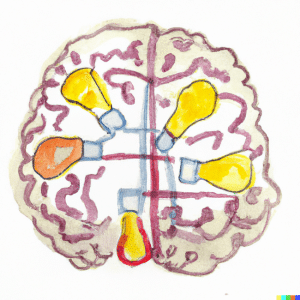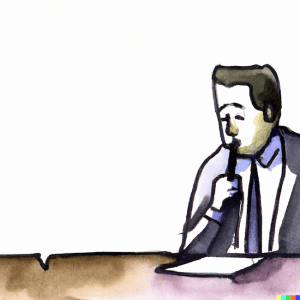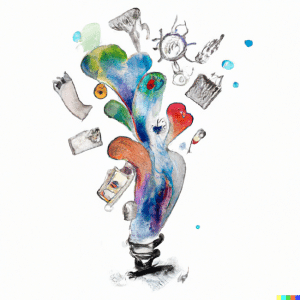Menu
March 9th, 2023
Art Credits: All artwork created by OpenAI’s DALL-E2 using the “watercolor sketch” style. Specific prompts are listed as the caption of each photo.
We’ve talked before about the pitfalls and problems with using ChatGPT and similar AI tools in your law practice. Many of them are the reasons we’re not too worried about robots taking over the practice of law anytime soon. Despite those flaws, however, we at Modern Firm are eager to see how people are beginning to explore AI’s potential to make legal work easier, more interesting, and more efficient for practicing human attorneys.
How Can I Safely Use AI in my Law Offices?
Current AI tools like ChatGPT are broadly trained, non-specialized language models. This makes them very poorly suited to writing at length or in detail about any element of the law.
That said, we've found three areas where even today's rudimentary tools can help you get more done each day.
Brainstorming
Tools like ChatGPT can be helpful in quickly generating a list of possible topics, which you can then winnow down to the few points that are useful. For example, if you were asked to give a talk on civil commitment, you could ask ChatGPT "What are things someone may be concerned about if they have a family member facing civil commitment?"

A brainstorm
When we did so, ChatGPT replied with a seven point list. Some were obvious ("The family may be concerned about the process and legal procedures involved"). Others were outside of a lawyer's area of expertise (like worries related to the cost of psychiatric care and treatment). But the list also included several points about social stigma and the health ramifications of going through a stressful legal proceeding, which could be the basis of a really interesting talk about how lawyers can compassionately assist families through such a difficult process.
Breaking Writer's Block
Most professionals struggle with "blank-page-phobia." The biggest hurdle to overcome is that blinking cursor at the top of a page that you need to fill with a well-phrased letter, article, or presentation.
When asked to "suggest five good openings for letters to a client about their divorce," ChatGPT offered five very solid starters.

A lawyer anxiously staring at a blank page holding a pen
Were any of them perfect? No. Some leaned on stodgy cliches ("I hope this email finds you well" might be an especially bad way to reach out to many divorce clients) and others seemed to make certain assumptions about the nature of the case. But it's likely that at least one of the five suggestions would give you an idea of how to start talking to your client about their specific situation.
Along these same lines, you can also use ChatGPT or similar tools to quickly generate a "negative example" to bounce your ideas off of. Let ChatGPT take a stab at writing that letter or article, then read what it wrote and ask yourself: How can I make this better? How can I be more precise? How can I eliminate unnecessary hedging? Speak more clearly? Give concrete examples?
But be very wary of anything factual that ChatGPT includes such as times, distances, direct quotes, article titles—even simple arithmetic. These can be ridiculously wrong.
Because it isn't checking or calculating anything—just checking a table that shows the likelihood that groups of words occur together—tools like ChatGPT will make mistakes very differently from the ones humans make. This can make it extremely tricky to proofread or fact-check computer-generated text. This may change in the future, but for the time being proceed with caution!
Creating Summaries
ChatGPT can create summaries of longer documents. You can directly ask ChatGPT to “summarize this:” and supply it the URL of the article you want summarized. It can even (to a limited degree) fine-tune those summaries. For example, try asking it to “summarize this for a second grader” or “summarize this for a high schooler.” If you have a shorter piece of writing that needs summarizing (less than about six pages) and isn’t available online, you can paste it directly into the chatbox.

Ideas being funneled into one place
Because you are feeding ChatGPT the material you want it to work with, there's a much lower likelihood of it inserting random errors. If you are having it to summarize a lengthy piece you wrote, you are in an excellent position to fact-check and proofread the output for accuracy.
Always Use Caution

A female lawyer cautiously approaching a chasm
If you're using AI to help you write anything you are going to share (whether as limited as a note to a client or as public as something for your website or LinkedIn), you'll want to be extremely cautious. We’ve discussed ChatGPT’s many pitfalls before; tools like ChatGPT chronically plagiarize, miscalculate, invent facts, and muddy issues. And ChatGPT’s voice is generic. In fact, on tests—like law school exams at the University of Minnesota Law School and portions of the multiple choice Multistate Bar Exam (MBE)—it is a dead average student. Definitionally, it can't be distinct—so it will leave out everything special that you might bring to the table for a client. At the same time, ChatGPT might wildly overpromise: always proofread with extreme caution and double check anything factual for errors. For all of these reasons, ChatGPT’s unedited output also won’t perform that well long-term as web copy: bot-generated sites may initially get traffic, but then get buried as their content shows itself as generic, unreliable, and unhelpful. Google outlines this quite nicely in their March 2023 guidance on AI generated content.
What's Next for AI-Tools in Law Offices
Where's all of this headed? Are chatbots and AI the end of lawyering as we know it? The Modern Firm's founder, Brendan Chard, doubts that. "To me, this feels like something of the magnitude of when search engines came out, or when the mobile Internet took hold. This is a whole new set of tools that will be rapidly evolving over the next few years. If you’re using that new tool in the right way, it will be incredibly helpful. These tools aren’t there yet, but they'll get there.”
Brendan foresees a future of "siloed or specialized AI tools"—bots and large language models specifically trained for a given field as opposed to the broad general-use models underpinning ChatGPT.

Computer brains in silos
Those tools will help intelligently lay out letters, pre-populate forms, and track down appropriate references, but still demand the guiding hand and mind of someone with specific training in the field. "I imagine there’s going to be ChatGPT for MN State Law," he explains, "or ChatGPT for Michigan Traffic Tickets. Something along the lines of a supercharged LexisNexis, or autocomplete for LLC formation. It’s not going to replace a lawyer any more than a power drill replaced the carpenter."
The most important thing to understand about tools like ChatGPT is that they are just one tool in a chain that you use to solve a problem—in much the same way that autocomplete, spellcheck, Grammarly, and getting the opinion of your partner are all tools you regularly use when composing an important letter. Just like you wouldn't trust autocomplete to reply to your spouse without your input, you'll likewise want to continue to keep a sharp (and critical) eye on anything the bots give you.




